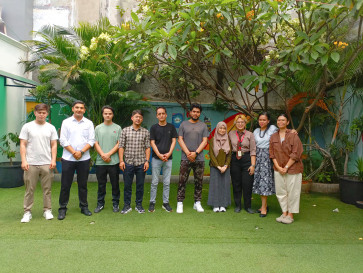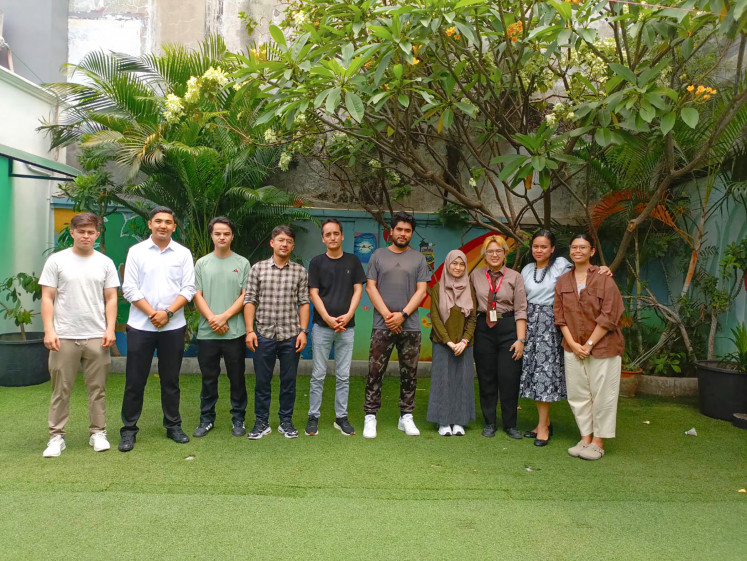Ever-evolving: An explorer of genres working under a variety of aliases, Kareem Soenharjo mingles with hip-hop as BAP, rock and punk with the band BAPAK and lo-fi instrumentals through Yosugi.
A vessel of one, a master of none, Kareem Soenharjo, alias BAP, is Jakarta’s very own multidisciplinary rockstar. Having recently published his third solo album titled, quite literally, M. Album Tiga (M. Album Three), he’s entered a new chapter in his career.
For Kareem, this release marks a kind of bravery previously unseen, though he leans once more into a bold sound.
“It represents the worst I have been and the best I could be in the future, hopefully,” he said.
In contrast to his last solo album, 2021’s MOMO’S MYSTERIOUS SKIN, where he was welcoming and happy, his new songs are brewed through discontent.
“It’s a tough listen for sure,” Kareem admitted. “These stories still haunt me to this day, actually.”
Whether happy or haunting, he can always be relied upon to produce art that is raw and real. He bares all, so we don’t have to.

Thank you!
For signing up to our newsletter.
Please check your email for your newsletter subscription.
The man who does it all
The proto-cool-kids of South Jakarta probably know Kareem from back when he was part of Cul De Sac, a hip-hop collective often heard at some of the more niche parties.
Guitar, saxophone, writing, DJ-ing, music production, illustrations; this man really does it all. Kareem embodies a daring persona that only the word “artist” can truly describe.
He released his first solo album, monkshood, in 2018. Then, along with his friends, Kareem launched a full-length album, Miasma Tahun Asu (Miasma of the Year of the Dog) under the band name BAPAK in 2020.
In 2022, he won Anugerah Musik Indonesia’s Best Hip Hop Soloist for his song, “Same Shoes, No Company”.
Multi-talent: Along with words and vocals, Kareem’s proficiency extends to the saxophone, guitar and DJ-ing. (Courtesy of BAP Kareem)
As a risk taker, Kareem’s songs have always been dauntlessly experimental. He mixes jazz, blues and noise, among other genres, but hip-hop is rooted in his soul.
Third time’s the charm
“Always go out with a bang,” Kareem says.
There’s a certain solemnity in his music that reflects who he is. Consistently and relentlessly, we see the same DNA throughout the 12 songs in M. Album Tiga: Strange yet enticing.
One of its anthemic tunes, “Wake up! Look Alive!”, illustrates the struggle to face monotonous daily routines, the expectation to interact with people and even the will to simply wake up in the morning.
“I like to think of it as a soundtrack of my life,” Kareem laughs.
The lyrics read as confrontational throughout the album. They come from a place of vulnerability, requiring one to take a long hard look at oneself while showcasing life’s mundane reality.
But that’s just the tip of the iceberg.
M. Album Tiga is packaged in a rawness that shows the intense, ugly and real parts of growing as a person. It’s like watching a movie: You’re introduced to a protagonist, their lore and battles, before reaching a conclusion. He agrees that it’s cinematic, but likens it more to the movie Shrek.
Keeping it raw: Kareem’s third album, M. Album Tiga, expresses deeply personal observations packaged with a sense of rawness and discontent. (Courtesy of BAP Kareem)
Starting out with over a hundred demos, this album’s creation was a long process. It captured his journey over the last two to three years as if it were a time capsule.
According to Kareem, the “M” in the title of this album stands for anything the listeners want it to. For him, it stands for “me”.
“It’s […] me. My third album, [which] at one point was fully mine,” Kareem shares. “The thing is, when you release art it stops [being] just yours. It also belongs to the rest of the world now, and then [it gets to] have its own meanings as it is theirs.”
Hungry and vulnerable
“When I was in college, I had this insatiable [literal] hunger. Every night, all I wanted was to eat,” Kareem explained.
Later on, he figured out it was actually loneliness he’d tried to fill.
Capturing this in the song “Hokben”, Kareem is straightforward when talking about his struggles with disordered eating.
It’s a track that is difficult to digest. Over a melancholic tune, he sings as if it were a confession:
“I used to […] stress eat a lot. I like eating alone.
Nobody judges you when you’re eating alone, at least, nobody that matters.”
“When it comes to eating alone, we often romanticize it; [this idea of] solitude in general,” Kareem explains.
“Sometimes people can’t differentiate between self-isolation and actual solitude over time. It turns into this horrible thing inside of you.”
Catharsis: With topics ranging from the banality of everyday life to a loneliness-induced eating disorder, Kareem sings the soundtrack of his life.
(Courtesy of BAP Kareem)
That vulnerability translates more deeply during his live performances. Last October, during a sold-out showcase at Krapela, Kareem drew the listeners in, especially with “bath song”.
The song splits into two parts: It opens with a sensuality and domineering self-assertion, then switches to something monstrously selfish.
When he sings “bruxism”, he dives into a bone-chilling display of well, bruxism, or teeth grinding.
As a does-it-all who bares it all, Kareem never fails to bring out both the best and worst of himself on stage. It’s a tough act to witness, but one can never look away.
Good night, moon
“Tampopo”, the closing track of this album, feels like a resting point. It’s a midway celebration, a lullaby, a prayer.
Listening to it feels like seeing stars behind your eyelids before falling into slumber.
“It’s for my mom. Even though there’s no vocals or lyrics, it’s a nod to a love [beyond words],” Kareem says.
Originally, Kareem wanted something much more disturbing to finish off the album, alluding to a continuation down the path of isolation. But he says, “things happen, and it redirects you.”
“I owe it to myself to have a happy ending for this album. It has to have a happy ending, because I want to have a happy ending for myself too.”
He imagines this same desire for comfort as a way to end his days, good or bad.
“I wish my nights sounded like this song for me and my mom.”
The dreamy tune is a reminder to bear hope.
“After all the chaos, the big and uncomfortable issues you have to face, it’s nice to know that it’s gonna be okay, no?”
Felicia Melody writes about lifestyle, beauty and fashion (and all things related to passion) from Jakarta. Some may say she’s all over the place, but she’s really just “always somewhere.”


























